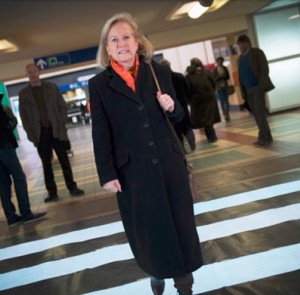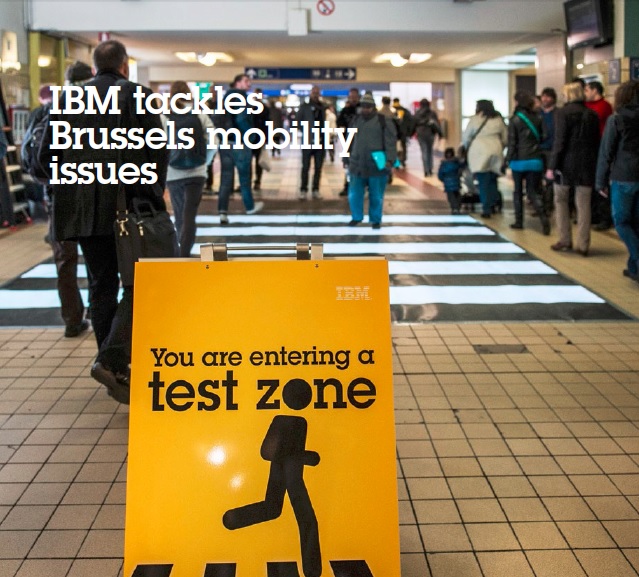Generic
IBM tackles Brussels mobility issues
07/11/2014 | Written by: Think Blog redactie (0cB)
Categorized: Generic
Share this post:
IBM experts are helping to unravel the traffic problems that have afflicted Brussels, with the company awarding the Brussels-Capital Region a Smarter City Grant valued at half a million US dollars. The city will use the funds to investigate ways of improving mobility in Brussels.
An important part of the solution to our mobility issue lies in integrating IT systems. Using the IBM Smarter City Grant, our first step will be to chart all the parties involved, as well as their systems.
Brussels is a beautiful urban region for both living and working in,”

Brigitte Grouwels, Brussels minister for Public Transport and IT
says Brussels minister for Public Transport and IT, Brigitte Grouwels, “but we’re facing major challenges when it comes to mobility. I am, however, convinced that the use of technology means that we can turn Brussels into a smart and mobile city.” And that makes the timing of the IBM Smarter City Grant all the more fortuitous, with Grouwels already spotting the opportunities it offers. “An important part of the solution to our mobility issue lies in integrating the IT systems of all the players involved. At the same time, technology can also provide us with new and innovative solutions.”
Cutting down on cars
Brussels has been endeavoring to improve mobility in the city for some time, and technology already plays a decisive role in many of these initiatives. “The capital has been a city of steel and concrete for too long,” says the minister. “I dream of a Brussels on a human scale, but that will require a great deal of effort not only from the authorities, but also from the citizens themselves.” It is still all too common for people to consider their cars as the only option every time they want to go somewhere, despite the fact that sixty percent of journeys within Brussels are of less than five kilometers. “That’s why we are investing in alternatives. The MIVB transport company carries almost a million passengers a day – a sixty percent increase on a decade ago – while we are also investing in a new subway line and a rapid tram line to connect the city to Flanders.” Traffic in Brussels has already been reduced from 10 years ago, and even though the general public might not immediately perceive it, Grouwels has the figures to prove it. “The proportion of journeys in Brussels taken by car has been cut from 56 to 37.5 percent over the last decade, while the proportion by public transport has increased from 15 to 25 percent.”
But that is not enough, and the city aims to cut back even further on car usage. One way of doing this is by using the existing infrastructure more efficiently, which is precisely where IT can be a catalyst for change. “One of those IT options is Osiris,” says Grouwels by way of example, “a software package that the authorities and public utilities can use to coordinate their travel activities in order to cause fewer disruptions to traffic. We also have a traffic-light control unit for changing traffic lights remotely depending on how congested the roads are, while there is also currently a trial project involving smart congestion charging, and many other ideas.”
An integrated approach
When it comes to mobility, the biggest challenge Brussels is facing today is the integration of all available means of transport: trains, buses, subways, taxis, bicycles, and car pooling must all become part of a coherent and consistent alternative to cars, with each mode of transportation contributing to the improvement of traffic flow. The capital city adopted this approach when it participated in the IBM Smarter Cities Challenge, a project that sees cities and regions around the world presenting their most pressing urban issues to IBM. Along with the 15 other participants, Brussels will receive a three-week visit from a team of IBM experts. The team will collect and analyze information and conduct dozens of interviews with commuters, businesspeople, public officials and non-profit employees. “The intention is to create an inventory of the needs of all parties concerned,” says Grouwels, “as well as what they may be able to contribute to a solution.”
The IBM exercise will generate a list of priorities and concrete projects. “IBM sees Brussels in a different way than we do, so they will provide a fresh perspective on our mobility issues. We’re expecting great things from it.” Brigitte Grouwels’ ideal vision for mobility in Brussels would be of the urban region as one large and centrally controllable entity. “That is the ultimate goal,” she says, “so that we can divert traffic f lows around a problem way in advance; so that we can adjust traffic lights and have variable road signs and so on.” It is simultaneously hoped that the city’s partnership with IBM will expose Brussels to all the potential applications of cutting-edge technology. The minister sees it as a relationship that will lead to new ideas. “IBM recently presented a smart pedestrian crossing here, which lights up when people cross it so that they are more visible to drivers. We immediately thought that we could have the crossing turn red when a tram approaches, alerting pedestrians that they have to wait until the tram passes.”
“It is those sorts of ideas that could soon make all the difference in Brussels.”
Automate work and accelerate business growth
Many companies need help to navigate the rapid changes that define today’s business environment. To improve their responsiveness and flexibility, they are looking for new ways of conducting business, rethinking their processes, and investing in digital transformation projects to increase the robustness of their operations. They rely on business automation technologies to cut out repetitive […]
Sustainability and the technologies enabling the transition
Creating a sustainable future demands significant technological innovation to decarbonize society, restore biodiversity and ecosystem health, foster thriving oceans for sustenance and economic growth, remove atmospheric carbon, transition to sustainable agriculture, and advance eco-friendly cities that align with our vision for a better future. Generative AI has achieved much in recent years and now surpasses […]
Technology in action at Think Summit 2021
Covid 19, the energy transition and climate change require business agility… right away! Organizations that are slowly starting their digital transformation are irrevocably overtaken by competitors: companies that can quickly realize new, sustainable business models with a remote workforce. How can organizations leverage innovations such as AI, machine learning and hybrid cloud to make […]




